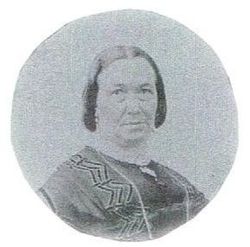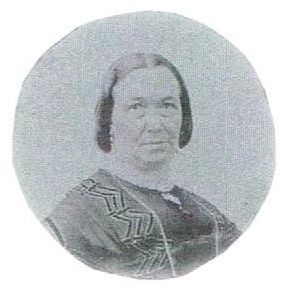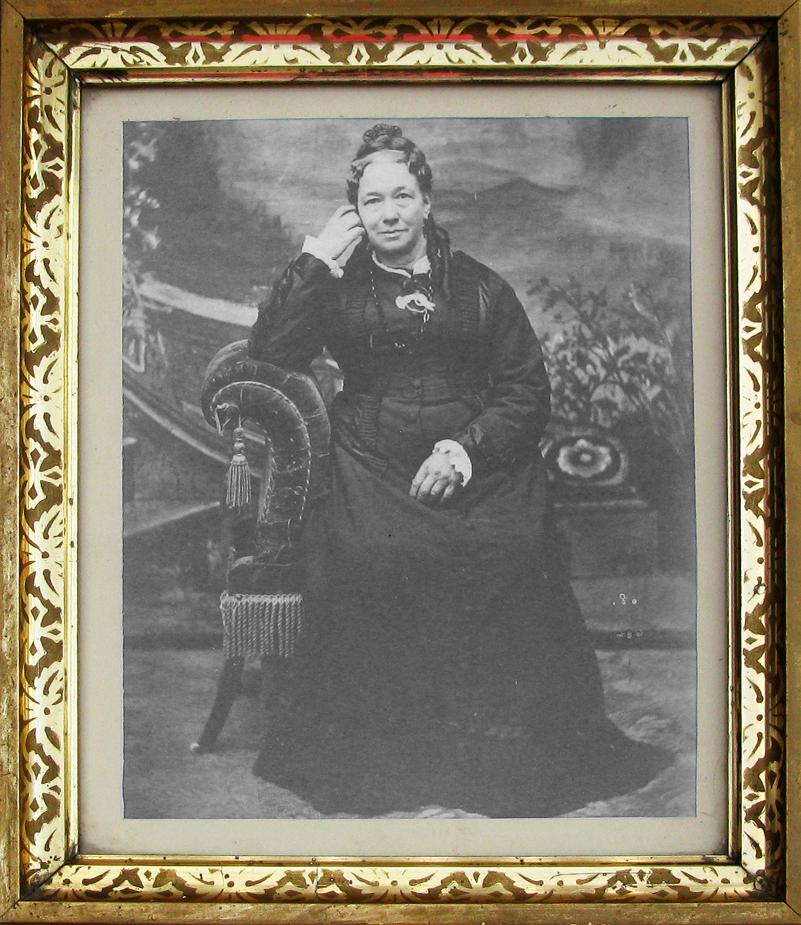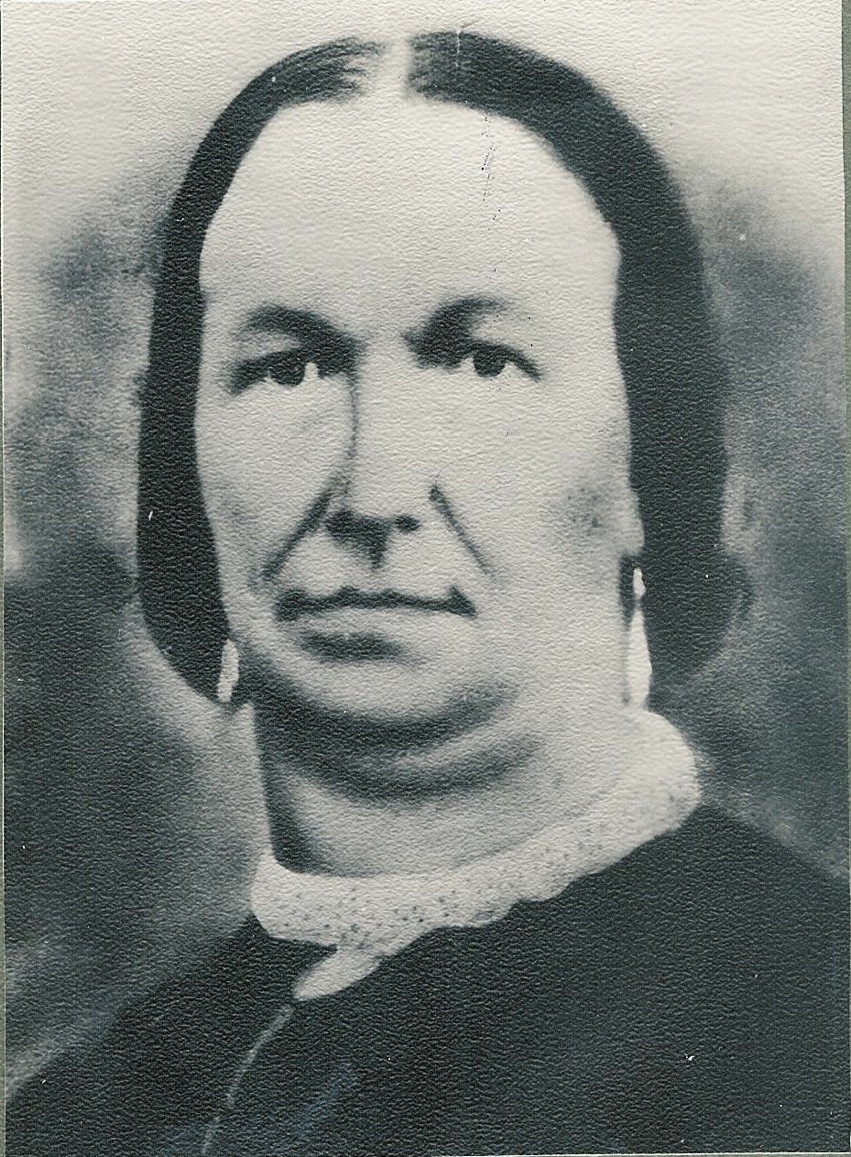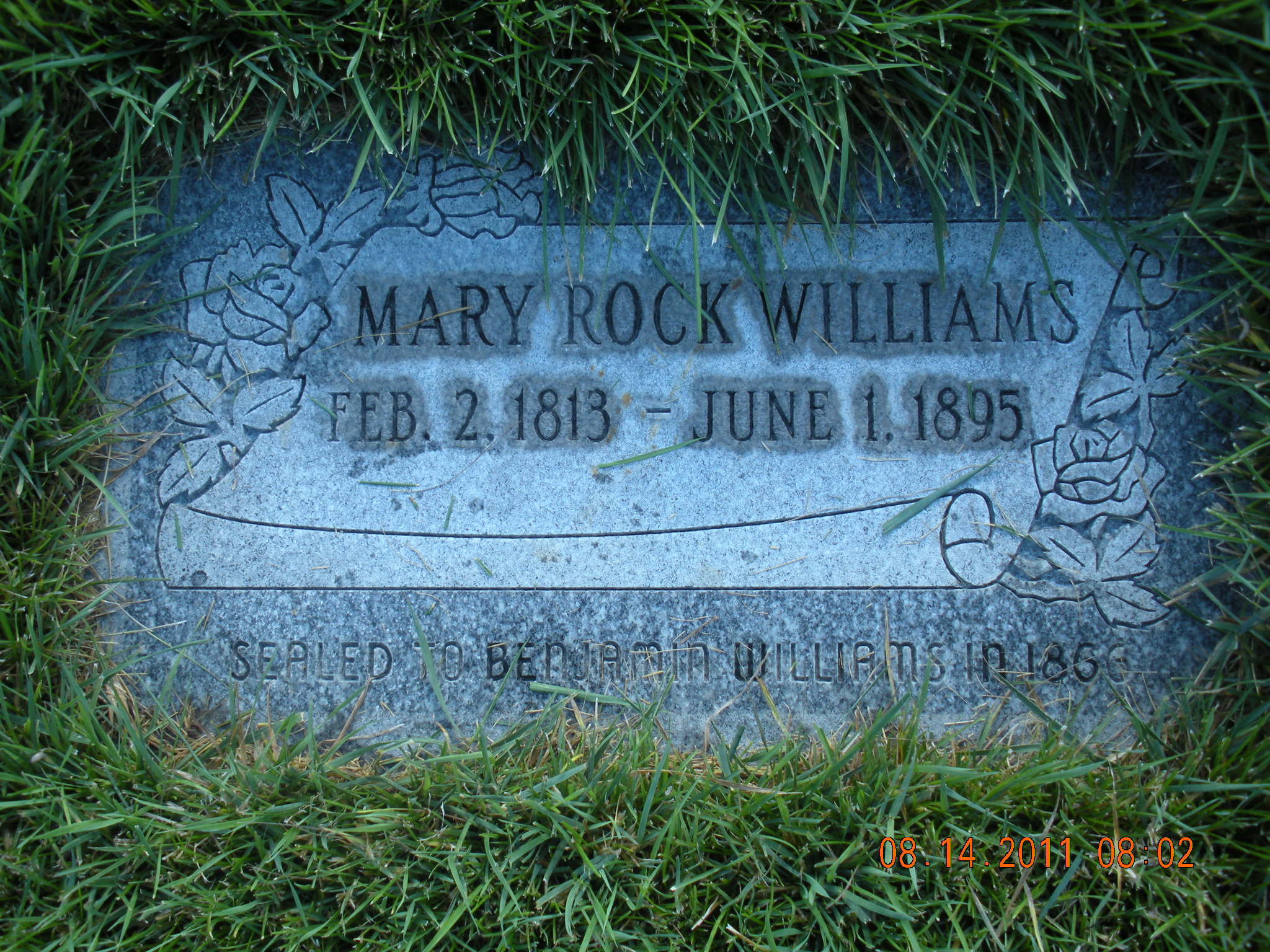Her 2nd husband is Edward Pugh.
An eternal thank you to Joleen Greenland for providing a copy of the following biography.
BIOGRAPHY OF MARY ANN ROCK WILLIAMS PUGH
Dictated to John Brooks, 27 Jul 1883
"I, Mary Ann Williams, daughter of George and Mary Rock, born in Westhide, Herefordshire, England, 2 Feb 1812, came to Nauvoo, Illinois, in Apr 1842 with my husband Benjamin Williams, and two small children, George A., and Lucy Maria. My husband purchased a full lot on the north side of Parley Street from Luman Calkins, receiving a full title to the same. We fenced the lot and built a frame house on it, dug a deep well and made necessary improvements to make us comfortable. My husband was a very hard working man.He and another man dug over a mile of fence ditch around a farm on the prairie and from constant exposure in the sloughs and swamps, he sickened and died in Dec 1842. I remained in my house until Sep 1846 when a company of armed men came to my house and told me that they had been promised "Booty and Beauty" by the commander and they would have it. They told me I should be protected, also my three children, George A., Lucy M., and Ephraim H., if I would forsake the Mormons. I replied, telling them that I had left my native country to join the Mormons and that I intended to follow them as soon as I could. Then they told me I must be off and out of my house in twenty minutes or take the consequences.
Having no team I could take but very little with me. I took a little bedding, about half a bushel of meal, a small piece of pork and started with my three children to the bank of the Mississippi River to avoid the beastly threats of the U.S. soldiers or mobbers, leaving my comfortable home with its furniture, clothing and bedding to the mercy of the U.S. soldiers and devils. On the bank of the river I found several hundred of my brethren and sisters and their children. The first night the mob would not allow us to lie on the bank of the river, but i was driven with my three orphan children down as close to the water as we could possibly get and had to lie on the hard rock, but not to sleep.The next morning, myself and about forty more women and children, who were sick with fever and ague were allowed to go further up on the bank and there we lay in the sun until night. The second night we were removed into a stone building where we lay on the rock floor, my apron folded and placed under my head, being the only thing I had to lie upon, my little son, Ephraim, being with me. He was then about three years old. When day came I was taken across the Mississippi River with others of our people. The mobbers would have the boats so heavily loaded, their intention being to sink the boats. We stood ankle deep in water in crossing and the mobbers frequently shouted that they hoped the boats would sink so they could see the end of the lot. Through great perserverance we were landed safely on the west side of the river.
By this time the mobbers had possession of our Temple and had made a fortress of it. About half and hour after we landed, the mobbers fired a ball from a canon in our Temple. The ball fell in the river throwing a shower of mud and water over us. We huddled together on the west side of the river, a number of us, and could not get away, the place being very swampy. No tongue can estimate the value of the property I was robbed of. What a comfort it would have been to me and my orphan children in our now destitution and desolation. Some of the brethren cut a pile of brush and made me a kind of bed on which I lay for six weeks, sick with fever and ague with my three orphan children half-starved and crying for food, without any shelter for them or their sick mother and exposed to the inclemency of the weather. The pen cannot describe not the tongue tell the suffering from exposure, destitution, starvation, sickness and death that surrounded us for the next two years.I will leave that part to the angel who will avenge the Saints of their wrongs when he pours out the vial of his wrath on the State of Illinois for having suffered these things to come upon innocent men, women and children in 1846.I lay in that awful condition for six or seven weeks through sickness and storm when some of the brethren made a temporary covering, that is, a few rough logs thrown together without roof or chimney. Our food consisted of cracked corn, and very little of that; nothing besides this, not even salt. When it is taken into consideration that this was winter, I think the conclusion will be that this was hard fare. When spring came nothing better presented itself. I lived many a day with only a pint of meal between three or four of us. We took the corn and mashed it in a log hollowed out for that purpose, this was the method of preparing meal that I spoke of. Through that summer I became so thin and feeble that light could almost be seen through my hands, for the most I had I fed to my children. A great deal more might be added, but let this suffice at present.
This is a true statement, but not half as bad as it was. This is my testimony before God, angels and men."
Her 2nd husband is Edward Pugh.
An eternal thank you to Joleen Greenland for providing a copy of the following biography.
BIOGRAPHY OF MARY ANN ROCK WILLIAMS PUGH
Dictated to John Brooks, 27 Jul 1883
"I, Mary Ann Williams, daughter of George and Mary Rock, born in Westhide, Herefordshire, England, 2 Feb 1812, came to Nauvoo, Illinois, in Apr 1842 with my husband Benjamin Williams, and two small children, George A., and Lucy Maria. My husband purchased a full lot on the north side of Parley Street from Luman Calkins, receiving a full title to the same. We fenced the lot and built a frame house on it, dug a deep well and made necessary improvements to make us comfortable. My husband was a very hard working man.He and another man dug over a mile of fence ditch around a farm on the prairie and from constant exposure in the sloughs and swamps, he sickened and died in Dec 1842. I remained in my house until Sep 1846 when a company of armed men came to my house and told me that they had been promised "Booty and Beauty" by the commander and they would have it. They told me I should be protected, also my three children, George A., Lucy M., and Ephraim H., if I would forsake the Mormons. I replied, telling them that I had left my native country to join the Mormons and that I intended to follow them as soon as I could. Then they told me I must be off and out of my house in twenty minutes or take the consequences.
Having no team I could take but very little with me. I took a little bedding, about half a bushel of meal, a small piece of pork and started with my three children to the bank of the Mississippi River to avoid the beastly threats of the U.S. soldiers or mobbers, leaving my comfortable home with its furniture, clothing and bedding to the mercy of the U.S. soldiers and devils. On the bank of the river I found several hundred of my brethren and sisters and their children. The first night the mob would not allow us to lie on the bank of the river, but i was driven with my three orphan children down as close to the water as we could possibly get and had to lie on the hard rock, but not to sleep.The next morning, myself and about forty more women and children, who were sick with fever and ague were allowed to go further up on the bank and there we lay in the sun until night. The second night we were removed into a stone building where we lay on the rock floor, my apron folded and placed under my head, being the only thing I had to lie upon, my little son, Ephraim, being with me. He was then about three years old. When day came I was taken across the Mississippi River with others of our people. The mobbers would have the boats so heavily loaded, their intention being to sink the boats. We stood ankle deep in water in crossing and the mobbers frequently shouted that they hoped the boats would sink so they could see the end of the lot. Through great perserverance we were landed safely on the west side of the river.
By this time the mobbers had possession of our Temple and had made a fortress of it. About half and hour after we landed, the mobbers fired a ball from a canon in our Temple. The ball fell in the river throwing a shower of mud and water over us. We huddled together on the west side of the river, a number of us, and could not get away, the place being very swampy. No tongue can estimate the value of the property I was robbed of. What a comfort it would have been to me and my orphan children in our now destitution and desolation. Some of the brethren cut a pile of brush and made me a kind of bed on which I lay for six weeks, sick with fever and ague with my three orphan children half-starved and crying for food, without any shelter for them or their sick mother and exposed to the inclemency of the weather. The pen cannot describe not the tongue tell the suffering from exposure, destitution, starvation, sickness and death that surrounded us for the next two years.I will leave that part to the angel who will avenge the Saints of their wrongs when he pours out the vial of his wrath on the State of Illinois for having suffered these things to come upon innocent men, women and children in 1846.I lay in that awful condition for six or seven weeks through sickness and storm when some of the brethren made a temporary covering, that is, a few rough logs thrown together without roof or chimney. Our food consisted of cracked corn, and very little of that; nothing besides this, not even salt. When it is taken into consideration that this was winter, I think the conclusion will be that this was hard fare. When spring came nothing better presented itself. I lived many a day with only a pint of meal between three or four of us. We took the corn and mashed it in a log hollowed out for that purpose, this was the method of preparing meal that I spoke of. Through that summer I became so thin and feeble that light could almost be seen through my hands, for the most I had I fed to my children. A great deal more might be added, but let this suffice at present.
This is a true statement, but not half as bad as it was. This is my testimony before God, angels and men."
